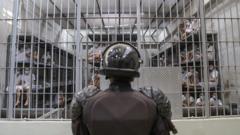**The US Supreme Court has temporarily halted the deportation of alleged Venezuelan gang members, citing civil rights concerns regarding their detention and deportation without due legal process.**
**Supreme Court Blocks Deportations of Venezuelan Gang Members Amid Legal Battle**

**Supreme Court Blocks Deportations of Venezuelan Gang Members Amid Legal Battle**
**Controversial wartime law invoked by Trump administration faces court scrutiny.**
The US Supreme Court has issued a stay on the deportation orders for several alleged Venezuelan gang members being held in detention facilities in north Texas. This decision comes amid legal challenges that claim these individuals have been denied the opportunity to contest their deportation in court, raising significant civil liberties concerns.
The Trump administration had utilized the 18th-Century Alien Enemies Act, a law first enacted in 1798, to justify these deportations. This act grants the president the authority to detain and deport individuals from countries deemed "enemy" nations without the standard legal procedures typically afforded to defendants. The last time this law was invoked was during World War II, leading to the internment of Japanese Americans without trial.
President Trump has publicly accused the Venezuelan gang Tren de Aragua of threatening U.S. national security, invoking strong rhetoric during his tenure. On April 8, data revealed that of the 261 Venezuelan nationals deported to El Salvador, approximately half faced removal under the Alien Enemies Act.
The legal battles have been complex, with lower courts initially blocking deportations on March 15. The Supreme Court confirmed on April 8 that while the Trump administration could pursue deportations under the Act, those affected must be granted a chance to legally challenge their removal.
A lawsuit led by the American Civil Liberties Union (ACLU) highlighted discrepancies in the deportation process, including notices delivered in English to Spanish-speaking detainees, which posed a challenge in their understanding of their rights. The ACLU emphasized the life-threatening risks these individuals faced if returned to countries with notorious prisons and high violence rates.
This ruling came after a controversial case in which the Trump administration admitted to mistakenly deporting Kilmar Ábrego García, a Salvadoran citizen accused of gang affiliation, who maintains his innocence. Despite claims of error, U.S. officials have stated he will never be permitted re-entry into the country.
In a recent visit to El Salvador, Senator Chris Van Hollen met with García, who has reportedly been transferred from a mega-prison to another facility. The ongoing legal and humanitarian implications of the case highlight the broader tensions surrounding immigration policy and civil rights under the current administration.



















